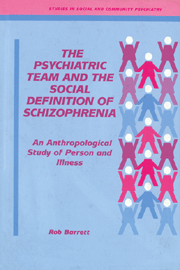 The Psychiatric Team and the Social Definition of Schizophrenia
The Psychiatric Team and the Social Definition of Schizophrenia Book contents
- Frontmatter
- Dedication
- Contents
- Foreword
- Preface
- Acknowledgements
- 1 Schizophrenia in Context
- 2 Time and Space in a Progressive Psychiatric Hospital
- 3 Professional Domains and the Dimensions of a Case
- 4 Clinical Teams and the ‘Whole Person’
- 5 Documenting a Case: The Written Construction of Schizophrenia
- 6 Moral Trajectories: From Acute Psychosis to ‘Chronic Schizophrenic’
- 7 Historical Formulations of Schizophrenia: Degeneration and Disintegration
- 8 Contemporary Formulations of Schizophrenia: Explaining the Inexplicable
- 9 Schizophrenia for Practical Purposes
- 10 The Person, the Case, and Schizophrenia
- References
- Index
8 - Contemporary Formulations of Schizophrenia: Explaining the Inexplicable
Published online by Cambridge University Press: 05 August 2016
- Frontmatter
- Dedication
- Contents
- Foreword
- Preface
- Acknowledgements
- 1 Schizophrenia in Context
- 2 Time and Space in a Progressive Psychiatric Hospital
- 3 Professional Domains and the Dimensions of a Case
- 4 Clinical Teams and the ‘Whole Person’
- 5 Documenting a Case: The Written Construction of Schizophrenia
- 6 Moral Trajectories: From Acute Psychosis to ‘Chronic Schizophrenic’
- 7 Historical Formulations of Schizophrenia: Degeneration and Disintegration
- 8 Contemporary Formulations of Schizophrenia: Explaining the Inexplicable
- 9 Schizophrenia for Practical Purposes
- 10 The Person, the Case, and Schizophrenia
- References
- Index
Summary
The definition of schizophrenia changes as psychiatric institutions and practices undergo change and as innovative research techniques produce new knowledge. Already suffused with cultural imagery, schizophrenia is like a sponge that absorbs new meanings with the passage of time. This chapter identifies several of the most important of these meanings by examining the pre-eminent twentieth century causal theories. Aetiological theories have tended to cluster around two poles—biological and psychosocial—which during the first part of the twentieth century were thought to be competing paradigms. In the last thirty years, a bio-psycho-social model of schizophrenia has emerged that encompasses these poles and necessitates a particular characterization of the patient's family in terms of expressed emotion.
I do not intend to provide a comprehensive survey of the causal theories of schizophrenia or seek to adjudicate as to which among these theories are right or wrong. That is the task of psychiatrists, neurophysiologists, psychologists, and social scientists involved in schizophrenia research. My purpose here is to identify the salient theories, explore their institutional and cultural underpinnings, and examine their radiating consequences. This anthropological approach is especially germane to biological theories. There has been a tendency in the social science literature to assume that if an illness has a biological basis cultural factors must be less important and vice versa, as if biology and culture were mutually exclusive. A number of social scientists have sought to debunk the biological evidence in order to assert a sociocultural explanation for the illness. Jackson (1960) and Coulter (1973) are good examples. As a consequence, they quickly become entangled in argu ments about the validity of particular hypotheses, and the methods of verifying or refuting them: they become trapped within the technicalities of the discourse. I am not concerned to evaluate the scientific merit of genetic and biochemical ideas about schizophrenia; rather, I wish to understand the cultural meanings they carry. Biology does not lie outside culture. Biological theories are developed by scientists and clinicians who work and think with cultural metaphors and images as well as underlying conceptual models of the person. Hence this chapter explores the meanings expressed in genetic and biochemical theories of schizophrenia and examines the consequences of accounting for one's experiences through these idioms.
- Type
- Chapter
- Information
- The Psychiatric Team and the Social Definition of SchizophreniaAn Anthropological Study of Person and Illness, pp. 217 - 254Publisher: Cambridge University PressPrint publication year: 1996
